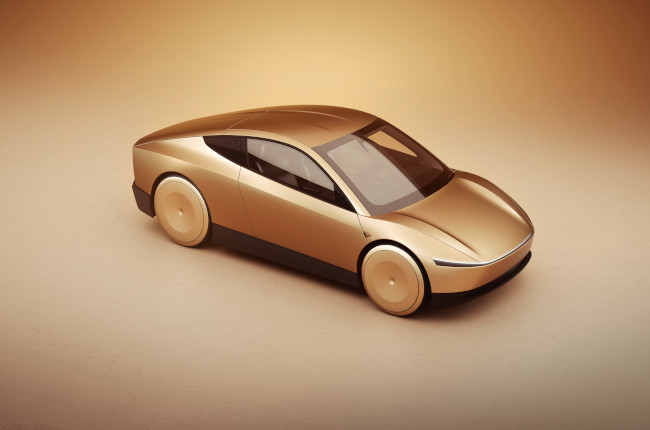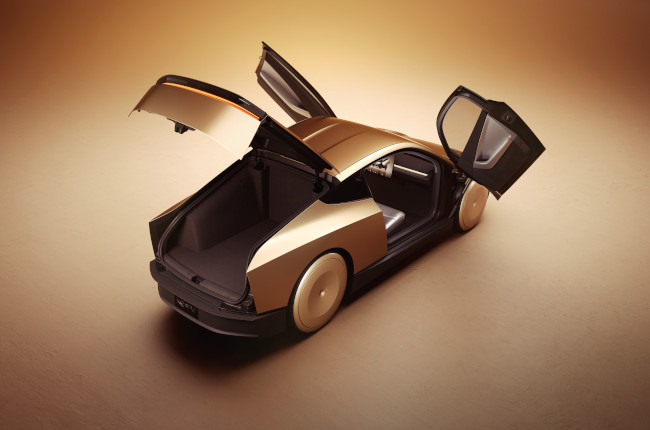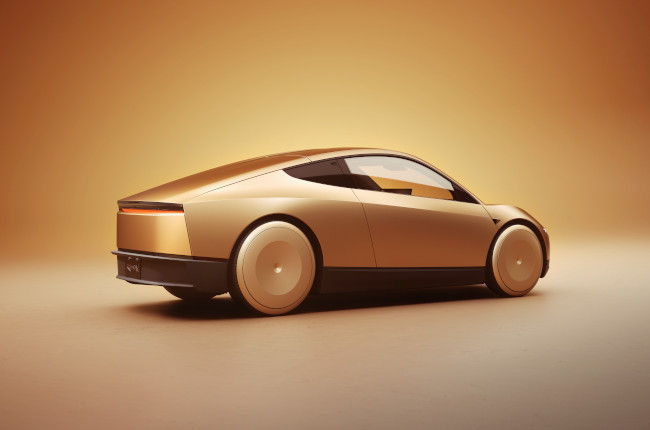
The much-awaited driverless Tesla Robotaxi, also known as the Cybercab, has been unveiled. Revealed last Thursday, October 10, 2024, 20 concept Cybercabs gave rides to attendees and showed off its autonomous driving capabilities at a private event in Warner Bros. Studios in Burbank, California.
As its name suggests, the Cybercab drew inspiration from the Cybertruck, evident in the Robotaxi's similar styling, especially with its front and rear light bars. However, it's much more compact and boasts a sleek, aerodynamic shape with seating for just two. The vehicle also sports a pair of unique dihedral doors and large disc-like wheel covers. Inside, there's no steering wheel or pedals—only a large screen at the center of the dashboard. It’s how you’d imagine a driverless car in a futuristic science-fiction movie would look, clean, flat, almost devoid of any design apart from its shape and material.
CEO Elon Musk didn’t provide any details on the Cybercab’s performance or range but mentioned it will be available to the public for under $30,000 USD or around P1.7 million in our currency. The vehicle will feature inductive charging, so there’s no need for a physical plug to recharge the battery. In a perfect world, this system would work harmoniously with roads that have built-in inductive charging, meaning you’d use hardly any electricity moving along those types of roads and essentially making electric vehicles viable for longer journeys.

Alongside the Cybercab reveal, Tesla made an announcement about the Model 3 and Model Y. Starting next year in Texas and California, these vehicles equipped with full self-driving (FSD) capability will be allowed to operate completely unsupervised. This will introduce a substantial fleet of Teslas using only cameras and onboard computing power onto public roads. The impact on road safety in these states remains to be seen, but hopefully, it will be smoother than some might anticipate.
Autonomous vehicles may still be a distant reality on Philippine roads, but cars with adaptive cruise control are already available, making long drives more comfortable. To explore these options, visit AutoDeal.com.ph and check out our comprehensive Car Guide.
Alongside the Cybercab reveal, Tesla made an announcement about the Model 3 and Model Y. Starting next year in Texas and California, these vehicles equipped with full self-driving (FSD) capability will be allowed to operate completely unsupervised. This will introduce a substantial fleet of Teslas using only cameras and onboard computing power onto public roads. The impact on road safety in these states remains to be seen, but hopefully, it will be smoother than some might anticipate.
Autonomous vehicles may still be a distant reality on Philippine roads, but cars with adaptive cruise control are already available, making long drives more comfortable. To explore these options, visit AutoDeal.com.ph and check out our comprehensive Car Guide.
Latest News
-
MIAS 2025: Chery presents three new models for the PH market / News
The Tiggo nameplate gets three new additions as Chery showcased at the 2025 Manila International Auto Show.
-
BYD showcases its extensive lineup at the 2025 MIAS / News
At the 2025 Manila International Auto Show, BYD flexed its EV and hybrid lineup for the Philippine market.
-
The Suzuki Dzire finally gets hybrid technology / News
Suzuki unveiled the Dzire hybrid at MIAS 2025, with the base model retailing for just P920,000.
Popular Articles
-
Cheapest cars under P700,000 in the Philippines
Jerome Tresvalles · Sep 02, 2024
-
First car or next car, the Ford EcoSport is a tough package to beat
Jun 18, 2021
-
Car Maintenance checklist and guide – here’s everything you need to know
Earl Lee · Jan 12, 2021
-
Most fuel efficient family cars in the Philippines
Bryan Aaron Rivera · Nov 27, 2020
-
2021 Geely Okavango — Everything you need to know
Joey Deriquito · Nov 19, 2020
-
Family cars in the Philippines with the biggest trunks
Sep 20, 2023
-
Head to head: Toyota Rush vs. Suzuki XL7
Joey Deriquito · Oct 28, 2020
-
Why oil changes are important for your car
Earl Lee · Nov 10, 2020
-
2021 Kia Stonic — What you need to know about it
Joey Deriquito · Oct 16, 2020
-
Top 7 tips for buying a used car in the Philippines
Joey Deriquito · Nov 26, 2020







